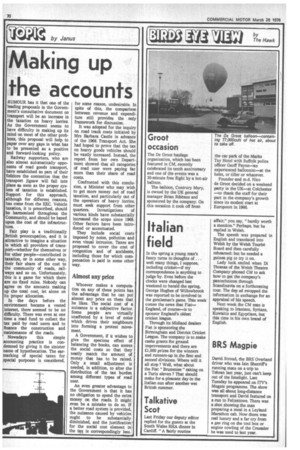Making up the accounts
Page 72

If you've noticed an error in this article please click here to report it so we can fix it.
RUMOUR has it that one of the leading proposals in the Government's consultative document on transport will be an increase in the taxation on heavy, lorries. As the Government seems to have difficulty in making up its mind on most of the other problems, this proposal will help to paper over any gaps in what has to be presented as a positive and forward-looking policy.
Railway supporters, who are also almost automatically opponents of road goods transport, have established as part of their folklore the contention that the transport jigsaw will fall into place as soon as the proper system of taxation is established. Support for this approach, although for different reasons, has come from the EEC. Vehicle taxation, it is prescribed, should be harmonised throughout the Community, and should be based upon the cost of the infrastructure.
Fair play is a traditionally British preoocupation, and it is attractive to imagine a situation in which all providers of transport—whether for themselves or for other people—contributed in taxation, or in some other way, their fair share of the cost to the community of roads, railways and so on. Unfortunately, this is a game for which there are no fixed rules. Nobody can agree on the amounts making up the total cost, let alone on its proper allocation.
In the days before the environment became a vested interest, there seemed to be no difficulty. There was even at one time a road fund to collect the tax paid by road users and to finance the construction and maintenance of the roads.
Nowadays this simple accounting practice is condemned by giving it the sinister name of hypothecation. The earmarking of special taxes for special purposes is considered, for some reason, undesirable. In spite of this, the comparison between revenue and expenditure still provides the only framework for discussion.
It was adopted for the inquiry on road track costs initiated by Mrs Barbara Castle in advance of the 1968 Transport Act. She had hoped to prove that the tax on heavy goods vehicles should be vastly increased. Instead, the report from her own Department showed that all categories of road user were paying far more than their share of road costs.
Confronted with this conclusion, a Minister who may wish to get more money out of road taxation, and particularly out of the operators of heavy lorries, must seek support from other quarters. Investigations of various kinds have substantially increased the scope since 1968. Other factors have been introduced or accentuated.
They include social costs imposed by noise, pollution and even visual intrusion. Taxes are proposed to cover the cost of congestion and of accidents, including those for which compensation is paid in some other way.
Almost any price
Whoever makes a computation on any of these points has the advantage that he can put almost any price on them that he likes. The social cast of a nuisance is a subjective factor. Some people are virtually unaffected by a level of noise which drives their neighbours into forming a protest movement.
A Government, if it wishes to give the specious effect of balancing the books, can assess the social costs so that they neatly match the amount of money that has to be raised. Only a small adjustment is needed, in addition, to alter the distribution of the tax burden among different types of road user.
An even greater advantage to the Government is that it has no obligation to spend the extra money on the roads. It might even be a mistake to do so. If a better road system is provided, the nuisance caused by vehicles ought to be substantiallyi diminished, and the justification, for the social cost element in the tax is correspondingly less.,
















































































































